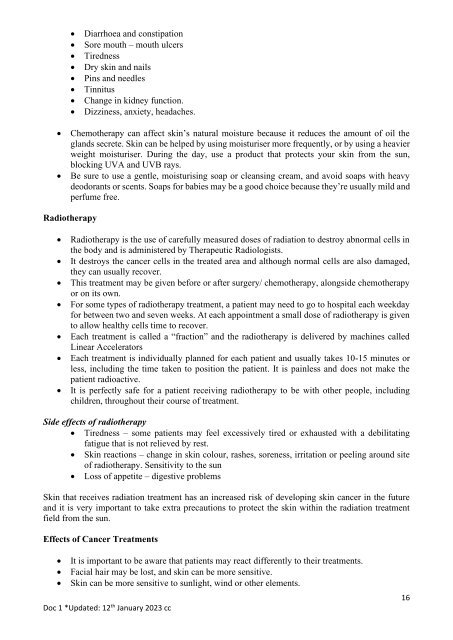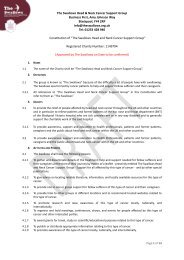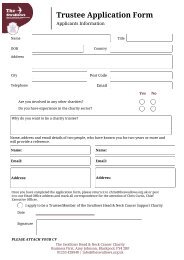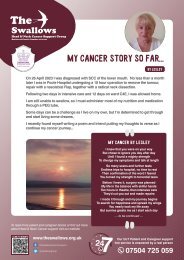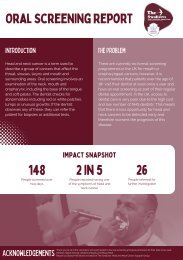1. Guidelines Best Practice 2023
This will help you the Patient/Caregiver lead with running the support group.
This will help you the Patient/Caregiver lead with running the support group.
You also want an ePaper? Increase the reach of your titles
YUMPU automatically turns print PDFs into web optimized ePapers that Google loves.
• Diarrhoea and constipation<br />
• Sore mouth – mouth ulcers<br />
• Tiredness<br />
• Dry skin and nails<br />
• Pins and needles<br />
• Tinnitus<br />
• Change in kidney function.<br />
• Dizziness, anxiety, headaches.<br />
• Chemotherapy can affect skin’s natural moisture because it reduces the amount of oil the<br />
glands secrete. Skin can be helped by using moisturiser more frequently, or by using a heavier<br />
weight moisturiser. During the day, use a product that protects your skin from the sun,<br />
blocking UVA and UVB rays.<br />
• Be sure to use a gentle, moisturising soap or cleansing cream, and avoid soaps with heavy<br />
deodorants or scents. Soaps for babies may be a good choice because they’re usually mild and<br />
perfume free.<br />
Radiotherapy<br />
• Radiotherapy is the use of carefully measured doses of radiation to destroy abnormal cells in<br />
the body and is administered by Therapeutic Radiologists.<br />
• It destroys the cancer cells in the treated area and although normal cells are also damaged,<br />
they can usually recover.<br />
• This treatment may be given before or after surgery/ chemotherapy, alongside chemotherapy<br />
or on its own.<br />
• For some types of radiotherapy treatment, a patient may need to go to hospital each weekday<br />
for between two and seven weeks. At each appointment a small dose of radiotherapy is given<br />
to allow healthy cells time to recover.<br />
• Each treatment is called a “fraction” and the radiotherapy is delivered by machines called<br />
Linear Accelerators<br />
• Each treatment is individually planned for each patient and usually takes 10-15 minutes or<br />
less, including the time taken to position the patient. It is painless and does not make the<br />
patient radioactive.<br />
• It is perfectly safe for a patient receiving radiotherapy to be with other people, including<br />
children, throughout their course of treatment.<br />
Side effects of radiotherapy<br />
• Tiredness – some patients may feel excessively tired or exhausted with a debilitating<br />
fatigue that is not relieved by rest.<br />
• Skin reactions – change in skin colour, rashes, soreness, irritation or peeling around site<br />
of radiotherapy. Sensitivity to the sun<br />
• Loss of appetite – digestive problems<br />
Skin that receives radiation treatment has an increased risk of developing skin cancer in the future<br />
and it is very important to take extra precautions to protect the skin within the radiation treatment<br />
field from the sun.<br />
Effects of Cancer Treatments<br />
• It is important to be aware that patients may react differently to their treatments.<br />
• Facial hair may be lost, and skin can be more sensitive.<br />
• Skin can be more sensitive to sunlight, wind or other elements.<br />
Doc 1 *Updated: 12 th January <strong>2023</strong> cc<br />
16


